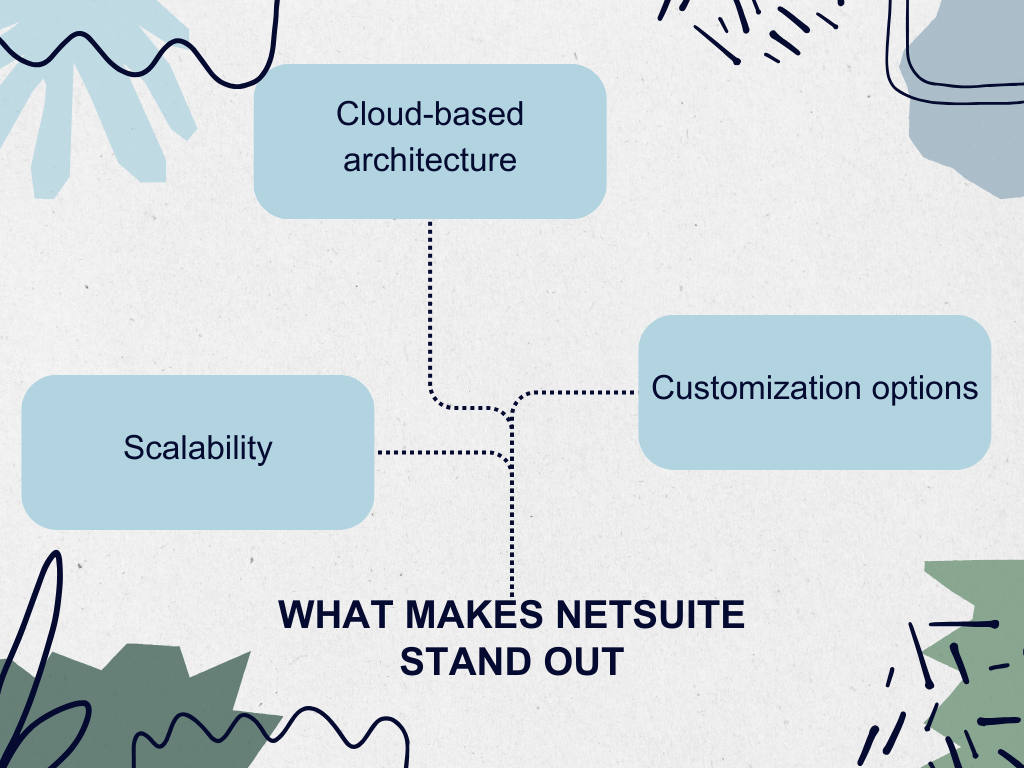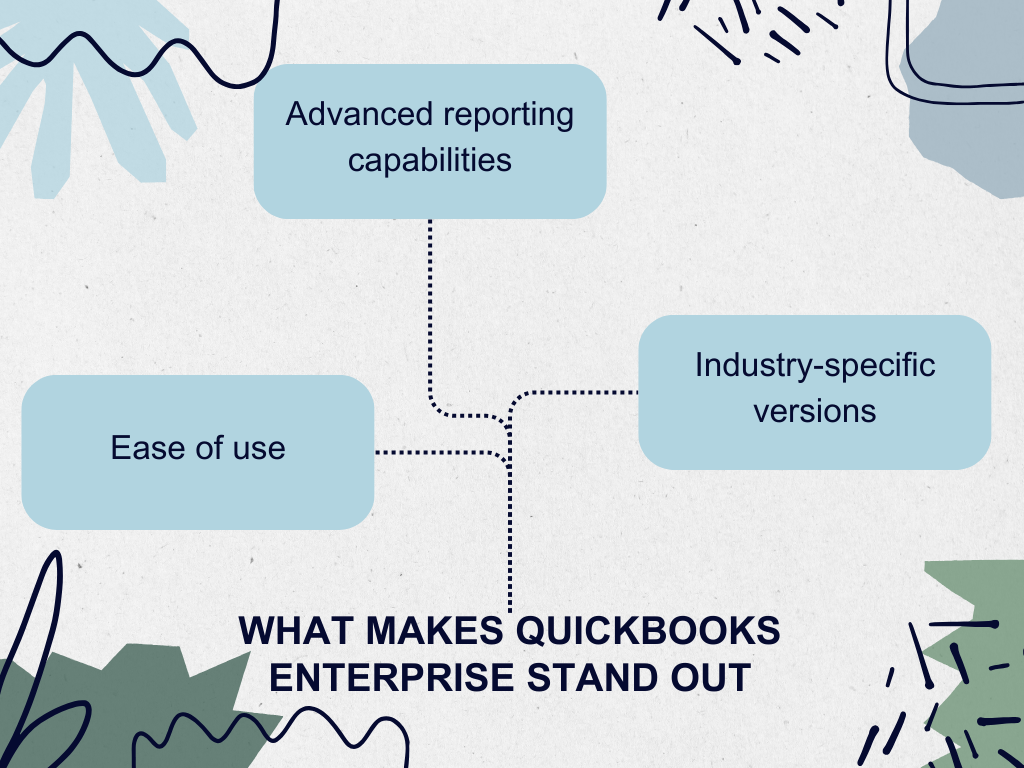Today’s business environment requires reliable accounting and business management solutions. As companies aim to increase efficiency and scalability and streamline their operations, the role of Enterprise Resource Planning (ERP) systems has become more significant than ever. NetSuite and QuickBooks Enterprise are two major players in this space, each offering unique features and capabilities.
In this article, we’ll compare these solutions, exploring their key features, services, and the considerations businesses should weigh when making this critical decision for their long-term success.
NetSuite vs QuickBooks: understanding the basics
Among business management solutions, NetSuite and QuickBooks stand out as stalwarts, each catering to distinct needs and preferences within the market. So, let’s start with getting a general idea about these solutions.
Definition and purpose of NetSuite
NetSuite’s solution, NetSuite ERP, is a cutting-edge cloud-based platform engineered by Oracle. It revolutionizes the way businesses operate by seamlessly integrating critical processes. At its core, NetSuite ERP is more than just accounting software. It’s a multifaceted solution that addresses financial management, CRM, and ecommerce, offering businesses an all-encompassing and centralized hub for operational management.
One notable feature is the NetSuite toggle, a user-friendly tool that allows seamless navigation and quick access to various functions within the system. This online toggle simplifies user experience, ensuring users can effortlessly switch between different modules, enhancing overall efficiency and productivity.
NetSuite also caters to the dynamic realm of online transactions, facilitating credit cards transactions through secure and efficient processes. Credit card services within the ERP system underscores NetSuite’s commitment to providing a comprehensive suite of tools to manage diverse financial aspects seamlessly.
Moreover, businesses utilizing NetSuite ERP benefit from a robust point-of-sale (POS) system. This POS functionality streamlines transactions and enhances customer experiences, further solidifying NetSuite’s position as an all-encompassing business management solution.
A crucial aspect of NetSuite’s appeal lies in its subscription-based model. This approach allows businesses to access and leverage the full spectrum of NetSuite services without substantial upfront investments. The subscription model aligns with the contemporary business landscape, offering scalability and flexibility and enabling users to adapt to evolving business needs.
NetSuite ERP is not just about managing data; it’s about optimizing and future-proofing business operations. By incorporating a credit calculator, businesses can assess and strategize their credit-related activities.
As you can see, it’s a comprehensive solution that blends technology with business expertise, offering flexibility and confidence to businesses.
Definition and purpose of QuickBooks (QuickBooks Online and QuickBooks Enterprise)
QuickBooks, a renowned accounting software developed by Intuit, has become synonymous with efficient financial management for businesses. In fact, the list of QuickBooks services and features QuickBooks offers is so extensive. From its inception, QuickBooks has expanded its suite of services to cater to diverse needs, embracing both small and medium-sized enterprises. Its flagship offering, QuickBooks Online, stands out as a premier solution in the industry, providing a user-friendly interface with powerful accounting capabilities. There’s also QuickBooks Desktop, a solution catering to businesses that prefer locally installed software.
As the business landscape continues to evolve, QuickBooks has adapted to meet the demands of larger enterprises through its specialized product, QuickBooks Enterprise. This version addresses the intricate operational requirements of sizable organizations. QuickBooks Enterprise maintains the user-friendly approach that has been a hallmark of the brand while incorporating advanced features that cater to the complexities of larger businesses.
One notable aspect of QuickBooks Enterprise is its advanced inventory management functionality. This feature goes beyond basic accounting needs and provides the tools to manage and optimize inventory on a larger scale. It can benefit businesses handling extensive product lines and intricate supply chain processes.
Customizable reporting is another standout feature of QuickBooks Enterprise, offering enterprises the flexibility to generate tailored reports that align with their unique reporting requirements. This capability empowers businesses to extract valuable insights from their financial data, facilitating informed decision-making at an enterprise level.
Additionally, QuickBooks Enterprise boasts comprehensive payroll features, ensuring that enterprises can efficiently manage their payroll processes in adherence to industry regulations. This way, it streamlines the payroll function, reducing the risk of errors and ensuring timely and accurate compensation for employees.
(You might want to read more about taxes and employment in a quick guide to 1099 vs W2.)
Whether it’s the accessibility of QuickBooks Online, the advanced functionalities of QuickBooks Enterprise, the familiarity of QuickBooks Desktop, or the adaptability to home accounting needs, QuickBooks continues to be a versatile and powerful tool in financial management.
However, below, speaking of QuickBooks, we’ll mean the enterprise QuickBooks version.
Differences in target audience and core functionalities
The distinctive characteristics of NetSuite and QuickBooks Enterprise are most evident in their target audience and core functionalities.
NetSuite, with its broad scope and scalability, caters to businesses ranging from SMEs to large corporations, emphasizing a unified ERP approach. QuickBooks, while still accommodating a variety of business sizes, maintains a focus on accessibility, making it an excellent choice for enterprises that need advanced features beyond basic accounting.
The core functionalities of NetSuite emphasize seamless integration, while QuickBooks prioritizes user-friendly accessibility with industry-specific enhancements.
Why choosing the right software is critical
As you can see, both solutions are about accounting for larger enterprises. However, businesses are not equally made. So, if one solution perfectly fits a company, it’s not necessarily a good fit for another. Selecting the appropriate software is critical at this point. Recognizing the unique requirements of a business and how the software in question addresses those needs can help make informed decisions and ensure the selected software aligns with the organization’s present needs and future growth aspirations.
Here’s why we’re breaking down the peculiarities of NetSuite and QuickBooks Enterprise further below.
A deeper look at NetSuite ERP features
Now, let’s look at NetSuite as a premier cloud-based Enterprise Resource Planning (ERP) system in more detail. It encompasses a rich array of features that underscore its market prominence. So. let’s break them down.
- Financial management capabilities
NetSuite offers a robust suite of financial tools, including a General Ledger that serves as a central repository for business data. The Accounts Payable and Receivable modules facilitate efficient management of payments and receivables, ensuring financial transparency and accuracy. - Inventory management
NetSuite inventory management provides businesses with a powerful tool for tracking and controlling stock levels. With features such as real-time visibility into inventory, order fulfillment optimization, and demand forecasting, users can streamline their supply chain operations. - Integrated CRM system
NetSuite features a seamlessly integrated Customer Relationship Management (CRM) system. It facilitates communication and collaboration between sales, marketing, and customer service teams. It empowers businesses to enhance customer interactions, manage leads effectively, and nurture client relationships throughout the customer lifecycle. - Real-time analytics and reporting
NetSuite is commited to informed decision-making. It is evident through its real-time analytics and reporting functionalities. Users can access up-to-the-minute insights into their business performance, enabling them to make data-driven decisions that positively impact their operations.
What makes NetSuite stand out
NetSuite possesses some distinctive features that contribute to its success in the ERP market, setting it apart from other solutions.

- Scalability
NetSuite’s scalability is a huge advantage for businesses in various stages of growth. Whether a small startup or a large enterprise, the platform accommodates evolving needs without the constraints associated with traditional on-premise systems. - Cloud-based architecture
The cloud-based architecture of NetSuite enhances accessibility and flexibility. Users can access data and functionalities via the Internet, promoting collaboration among geographically dispersed teams. This modern approach ensures that businesses can adapt to the demands of the digital age. - Customization options
NetSuite acknowledges the diversity of business needs and provides robust customization options. Businesses can tailor the ERP system to their unique requirements, from creating custom fields to implementing workflow automation. This adaptability ensures that NetSuite integrates smoothly with the specific complexities of every business.
QuickBooks services: a look at QuickBooks features
Now, let’s turn our heads toward QuickBooks Enterprise to explore its comprehensive set of features designed to meet the diverse needs of businesses. QuickBooks presents a holistic approach to business management, addressing critical aspects such as financial management, inventory tracking, business analytics, and more. Its user-friendly interface and advanced functionalities make it a valuable solution for businesses aiming to streamline operations and gain meaningful insights into their overall performance.
Let’s break it down.
- Financial management
QuickBooks provides a comprehensive suite of tools. The General Ledger feature offers a transparent overview of financial transactions. The platform further facilitates efficient Accounts Payable and Receivable management, ensuring businesses can easily track payments and receivables. Expense tracking is simplified, supporting budgeting and financial planning. - Inventory management
QuickBooks Enterprise excels in real-time inventory tracking, enabling businesses to stay on top of stock levels. The platform’s advanced pricing options allow for customizable pricing rules based on customer type or location (and more). Order fulfillment is optimized through streamlined workflows, contributing to improved customer satisfaction. - CRM integration
The seamless integration of QuickBooks with Customer Relationship Management (CRM) systems enhances overall customer relationship management. This integration fosters a unified approach to customer interactions, enabling sales, marketing, and customer service teams to access up-to-date customer information. Lead and opportunity management features further support businesses in efficiently navigating the sales pipeline. - Business analytics
QuickBooks empowers businesses with customizable reporting options, offering detailed financial insights tailored to specific needs. Beyond basic reporting, the platform provides advanced analytics tools, allowing users to delve deeper into their financial data. Additionally, the platform supports budgeting and forecasting, aiding businesses in strategic decision-making aligned with their growth objectives.
What makes QuickBooks Enterprise stand out

- Ease of use
QuickBooks prides itself on being accessible to users with varying levels of expertise. The intuitive design ensures that businesses can navigate the software efficiently, streamlining day-to-day operations and reducing the learning curve for new users. - Advanced reporting capabilities
One of the standout features of QuickBooks is its advanced reporting capabilities. The software provides robust reporting tools that empower businesses to generate detailed financial reports, analyze performance metrics, and make data-driven decisions. It also allows for custom reporting so users can tailor their financial insights to specific needs. - Industry-specific versions
QuickBooks Enterprise goes beyond a one-size-fits-all approach with its industry-specific versions, catering to various industries, like manufacturing, retail, construction, and more. This specialization ensures that businesses receive features and functionalities specifically crafted to enhance operations within their industry.
Let’s compare NetSuite and QuickBooks with other SME and enterprise-level accounting software
As businesses explore accounting and enterprise-level solutions, the comparison often extends beyond QuickBooks and NetSuite. Several alternative accounting software options cater to the diverse needs of both small and medium enterprises (SMEs) and large corporations. Here’s a look at some noteworthy alternatives to QuickBooks and NetSuite.
Xero
Xero caters primarily to small and medium-sized enterprises (SMEs) and freelancers. Its user-friendly interface and affordability make it a suitable choice for businesses seeking simplicity in their accounting solutions.
Key features
- Cloud-based accounting
- Xero offers a cloud-based platform, providing accessibility and real-time collaboration.
- Invoicing
- Xero simplifies the invoicing process with customizable templates and automated reminders.
- Expense tracking
- Xero streamlines expense tracking, facilitating accurate financial record-keeping.
QuickBooks vs Xero
When choosing accounting solutions for small and medium-sized enterprises (SMEs), QuickBooks and Xero often come to mind first. Each platform offers unique features, and businesses must carefully consider their specific needs before deciding on which one to choose. Let’s look at QuickBooks vs Xero real quick.
- QuickBooks has long been a go-to accounting solution for SMEs due to its versatility. The platform caters to businesses with varying accounting needs, providing a range of features from basic bookkeeping to more advanced financial management.
- QuickBooks employs a tiered subscription structure, offering different plans tailored to the specific requirements of businesses. This approach allows companies to choose a package that aligns closely with their financial management needs and budget constraints.
- Xero stands out for its streamlined and user-friendly approach. SMEs, particularly those with straightforward accounting requirements, often find Xero’s interface intuitive and easy to navigate. This simplicity can be particularly appealing for businesses needing a simple accounting solution.
- One of Xero’s strengths lies in its transparent pricing model. Xero offers a clear breakdown of its subscription plans, making it easier for businesses to understand the costs associated with their chosen package. This transparency contributes to a more straightforward budgeting process.
NetSuite vs Xero
Let’s look at NetSuite vs Xero. We already mentioned that NetSuite addresses the needs of growing SMEs and larger enterprises.
- Scalability is a key differentiator when NetSuite is compared to Xero. Designed to accommodate the growth trajectory of SMEs into larger enterprises, NetSuite ensures that businesses can seamlessly expand their operations without encountering the limitations often associated with simpler accounting platforms.
- Unlike Xero, which primarily focuses on accounting, NetSuite offers a comprehensive suite of services. In addition to financial management, NetSuite integrates Customer Relationship Management (CRM) and supply chain management functionalities. This all-in-one approach streamlines various business operation aspects, promoting efficiency and synergy.
- NetSuite allows you to create roles for each employee. This feature enhances security and control, ensuring that individuals have access only to the information and functionalities relevant to their roles within the organization.
- NetSuite’s cash management tools are more comprehensive compared to Xero. The platform provides robust tools for managing cash flow, ensuring businesses have a real-time understanding of their financial liquidity. This comprehensive approach aids in strategic financial planning and decision-making.
Sage Intacct
Sage Intacct is an accounting solution for larger enterprises grappling with complex financial operations. Tailored to organizations that demand advanced financial management capabilities and scalability, Sage Intacct is a sophisticated solution for entities dealing with intricate finance management.
Key features
- Advanced financial reporting
Sage Intacct offers a suite of sophisticated financial reporting tools that go beyond basic financial statements. These tools empower enterprises to delve into in-depth financial analysis, providing actionable insights for strategic decision-making. - Multi-entity management
Recognizing the complexity faced by enterprises with multiple entities, Sage Intacct streamlines financial operations through robust multi-entity management. This feature ensures a cohesive and unified view across the entire organizational structure. - Automation
Automation is at the core of Sage Intacct’s offerings. The platform automates complex financial processes, reducing manual intervention, minimizing errors, and significantly enhancing overall operational efficiency.
Sage Intacct vs QuickBooks
- Sage Intacct excels in handling the intricacies of complex financial operations. It is well-suited for enterprises with multifaceted financial needs. In contrast, QuickBooks may be preferable for businesses with simple accounting requirements.
- Sage Intacct is specifically engineered for scalability, making it an ideal choice for enterprises on a growth trajectory. QuickBooks, in turn, may face limitations when compared to Sage Intacct’s tailored scalability features.
NetSuite vs Sage Intacct
- Sage Intacct primarily focuses on elevating financial management capabilities. In contrast, NetSuite offers a more extensive Enterprise Resource Planning (ERP) suite. Beyond financial management, NetSuite encompasses Customer Relationship Management (CRM) and supply chain management, providing a broader spectrum of services.
- Both Sage Intacct and NetSuite boast scalability, allowing businesses to expand their operations seamlessly. However, the advantage of NetSuite lies in its comprehensive suite of services, making it potentially more advantageous for businesses with diverse operational needs.
Microsoft Dynamics 365 Finance
Microsoft Dynamics 365 Finance is a powerful platform designed to address the financial needs of larger organizations, offering a comprehensive suite of tools for enhanced financial control.
Key features
- Integration
Dynamics 365 Finance distinguishes itself through seamless integration with other Microsoft applications. This interconnected environment creates a unified business management ecosystem, promoting data consistency and facilitating streamlined operations. - Advanced analytics
Dynamics 365 Finance places a strong emphasis on providing advanced financial analytics tools. Businesses can delve into in-depth insights, leveraging sophisticated analytics to gain a comprehensive understanding of their financial landscape. - Budgeting and forecasting
The platform supports robust budgeting and forecasting functionalities. This empowers enterprises to engage in strategic financial planning, enabling them to make informed decisions and adapt to changing market conditions.
QuickBooks vs Dynamics 365 Finance
- When comparing Dynamics 365 Finance vs QuickBooks, it excels in integration with other Microsoft applications, ensuring a cohesive business management experience.
- While QuickBooks offers various integrations, Dynamics 365 Finance’s depth of integration within the Microsoft ecosystem sets it apart.
- Dynamics 365 Finance aims at larger enterprises with complex financial needs, addressing scalability and intricate financial operations.
- Positioned as a suitable solution for SMEs, QuickBooks may lack the depth required for the complexities of enterprise-level financial management.
NetSuite vs Dynamics 365 Finance
- NetSuite boasts extensive ERP capabilities covering a range of services, including financial management, CRM, and supply chain management.
- While comprehensive, Dynamics 365 Finance may not offer the same breadth of ERP functionalities as NetSuite.
- Dynamics 365 focuses on broad financial management capabilities, making it versatile across industries but potentially lacking in industry-specific tailoring compared to NetSuite.
NetSuite or QuickBooks: choosing the right solution for your business
As mentioned above, selecting the right software is a critical decision that can significantly impact the efficiency and success of an organization. For many businesses, after thorough research, the choice often boils down to two major players. And choosing the most suitable one can be a tough case.
Factors to consider when deciding between NetSuite and QuickBooks Enterprise
So, NetSuite or QuickBooks ? Understanding the factors that differentiate these solutions and considering the specific needs of your business is crucial in making an informed decision.
Business size and complexity
- NetSuite: Renowned for its scalability, NetSuite caters to businesses of varying sizes, from small startups to large enterprises. Its comprehensive suite of integrated services makes it suitable for organizations with complex operational needs.
- QuickBooks : While accommodating a range of business sizes, QuickBooks is remarkably user-friendly, making it an attractive option for small to midsize enterprises (SMEs) with simple accounting and operational requirements.
Scope of operations
- NetSuite: Businesses with diverse operational facets benefit from the all-in-one approach of NetSuite. It integrates financial management, inventory control, and customer relationship management (CRM) into a unified platform, ideal for organizations seeking comprehensive solutions.
- QuickBooks Enterprise: Well-suited for businesses focused on accounting, QuickBooks offers industry-specific versions catering to manufacturing, retail, and other sectors. It is a solid choice for companies with specific needs within their industry.
Budget considerations
- NetSuite: Recognized for its advanced features, NetSuite comes with a corresponding price tag. Businesses should carefully evaluate their budget and weigh the costs against the benefits of its comprehensive suite of services.
- QuickBooks Enterprise: With a reputation for affordability, QuickBooks provides a cost-effective solution for businesses that prioritize a user-friendly interface and industry-specific functionalities.
Recommendations for businesses of different sizes and industries
The business size and industry you operate in may impact your choice. You know, sometimes you might feel like you need to grow into the software you’re using. We mean that you may have a comprehensive solution only to find out that you don’t need (yet) all the features and services it provides. Meanwhile, you’re paying for everything. That’s why it is critical to understand what functionality you need and what is unnecessary at the selection stage. So, let’s look at what can be a better choice for businesses of different sizes and of various industries.
Small to midsize enterprises (SMEs)
- NetSuite: SMEs experiencing rapid growth and foreseeing expansion can benefit from NetSuite’s scalability. Its cloud-based architecture provides flexibility, allowing businesses to adapt to changing demands seamlessly.
- QuickBooks : SMEs with simple operational needs and a focus on user-friendly accounting solutions may find QuickBooks Enterprise a fitting choice.
Large enterprises
- NetSuite: Large enterprises with complex business processes and an all-encompassing ERP system requirement should consider NetSuite. Its scalability and integrated suite make it a preferred choice for organizations with intricate operational demands.
- QuickBooks: While suitable for large enterprises with straightforward accounting needs, QuickBooks Enterprise may face limitations for those requiring a more comprehensive ERP solution.
Industry-specific needs
- NetSuite: Businesses operating across diverse industries can benefit from NetSuite’s all-in-one approach, providing industry-agnostic solutions that can be tailored to specific requirements.
- QuickBooks Enterprise: Industries such as manufacturing, retail, and construction may find QuickBooks Enterprise appealing due to its industry-specific versions, offering features tailored to sector-specific challenges.
Consulting with professionals
Choosing between NetSuite and QuickBooks Enterprise is a nuanced decision that requires a deep understanding of your business’s unique needs and the capabilities of each solution. Consulting with professionals can provide invaluable insights and guidance. There can be consulting firms specializing in implementing and optimizing accounting and business management solutions. Also, your accountant or an accounting agency you partner with can guide you through research and selection, ensuring that the chosen software aligns seamlessly with your business’s specific requirements and growth aspirations.
Exploring NetSuite and comparing it vs QuickBooks: bottom line
As you can see, when handling enterprise resource planning, the NetSuite vs QuickBooks choice can be a decision that hinges on the specific business needs and scale. And you might want to compare these solutions before coming to a decision.
NetSuite offer cloud-based financial management software designed to help companies navigate the complexities of modern business operations. NetSuite’s inventory management offerings are more complex than QuickBooks Online’s and even those of QuickBooks Enterprise, so businesses with advanced requirements and a focus on scalability may find NetSuite the optimal choice. Compared to NetSuite, QuickBooks supports businesses with basic accounting requirements.
However, it’s crucial to note that NetSuite pricing is substantially higher than QuickBooks pricing, making the latter a more budget-friendly option for businesses with basic accounting needs.
Ultimately, in the ongoing debate of NetSuite vs QuickBooks, the decision rests on assessing features, scalability, and financial considerations to ensure the selected solution aligns with a business’s goals and needs and addresses industry-based requirements.






